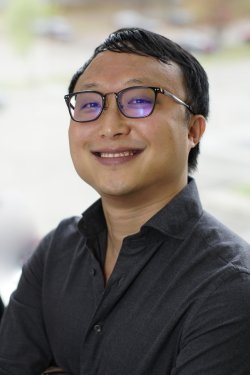
View Profile Page

Subong Kim
Assistant Professor, Communication Sciences and Disorders, College for Community Health
- Office:
- 1515 Broad Street 2180
- Email:
- kimsub@montclair.edu
- Phone:
- 973-655-7946
- vCard:
- Download vCard
Profile
Dr. Subong Kim is an Assistant Professor of Audiology in the Department of Communication Sciences and Disorders at Montclair State University. Dr. Kim received his Ph.D. degree in Speech and Hearing Science from the University of Iowa in 2020 and did his postdoctoral training in Auditory Neuroscience at Purdue University.
He directs the Hearing Outcome and Neuroscience (HON) Lab, which aims to understand the underlying cause of individual variability in speech-in-noise perception among listeners with similar audiograms and explore a systematic, biology-guided approach to personalizing hearing intervention.
One line of his work involves combining a wide range of physiological and psychophysical measures to identify the biological factors driving individual differences in speech-in-noise outcomes and noise tolerance. Another line of his research is relevant to individual cognitive functions such as auditory selective attention and working memory, and perceptual training with a brain-computer interface.
Selected publications:
Kim, S., Arzac, S., Dokic, N., Donnelly, J., Genser, N., Nortwich, K., & Rooney, A. (2025). Individual noise-tolerance profiles and neural signal-to-noise ratio: Insights into predicting speech-in-noise performance and noise-reduction outcomes. Audiology Research, 15(4), 78. https://doi.org/10.3390/audiolres15040078.
Kim, S., Schroeder, M., & Bharadwaj, H.M. (2025). Effect of digital noise reduction processing on subcortical speech encoding and relationship to behavioral outcomes. Scientific Reports, 15, 22198. https://doi.org/10.1038/s41598-025-07652-9.
Kim, S., Arzac, S., Dokic, N., Donnelly, J., Genser, N., Nortwich, K., & Rooney, A. (2024). Cortical and subjective measures of individual noise tolerance predict hearing outcomes with varying noise reduction strength. Applied Sciences, 14(16), 6892. https://doi.org/10.3390/app14166892.
Kim, S., Wu, Y.-H., Bharadwaj, H.M., & Choi, I. (2022). Effect of noise reduction on cortical speech-in-noise processing and its variance due to individual noise tolerance. Ear and Hearing, 43(3), 849-861. https://doi.org/10.1097/AUD.0000000000001144.
Kim, S., Emory, C., & Choi, I. (2021). Neurofeedback training of auditory selective attention enhances speech-in-noise perception. Frontiers in Human Neuroscience, 15, 676992. https://doi.org/10.3389/fnhum.2021.676992.
Kim, S., Schwalje, A.T., Liu, A.S., Gander, P.E., McMurray, B., Griffiths, T.D., & Choi, I. (2021). Pre- and post-target cortical processes predict speech-in-noise performance. NeuroImage, 228, 117699. https://doi.org/10.1016/j.neuroimage.2020.117699.
Kim, S., Choi, I., Schwalje, A.T., Kim, K., & Lee, J.H. (2020). Auditory working memory explains variance in speech recognition in older listeners under adverse listening conditions. Clinical Interventions in Aging, 15, 395-406. https://doi.org/10.2147/CIA.S241976.
Specialization
Individual differences in speech-in-noise perception, Cortical dynamics, Subcortical encoding, Peripheral pathophysiology, Selective attention, Hearing aids, Cochlear implants, Neurofeedback training
Resume/CV
Office Hours
Fall
- Tuesday
- 10:00 am - 11:00 am
- 1:45 pm - 2:15 pm
- Thursday
- 10:00 am - 11:00 am
- 1:45 pm - 2:15 pm
Spring
- Monday
- 10:00 am - 11:00 am
- Tuesday
- 1:00 pm - 2:00 pm
- Thursday
- 11:30 am - 12:30 pm
Links
Montclair State University does not endorse the views or opinions expressed in a faculty member's webpage or website. Consistent with the principles of academic freedom, the content provided is that of the author and does not express the opinions or views of Montclair State University.
Research Projects
Influence of Individual Pathophysiology and Cognitive Profiles on Noise Tolerance and Noise Reduction Outcomes
This project investigates the biological mechanisms influencing how individual hearing-aid users react to background noise and commonly used noise-reduction algorithms. A fundamental limitation of current audiological management is that individuals clinically classified with the same hearing status can have distinct biological profiles of underlying hearing damage and different cognitive abilities. The Hearing Health Foundation Emerging Research Grants fund Dr. Kim's experiments that seek to characterize these individual variations and identify the distinct sub-groups. The insights gained from these experiments can help guide larger follow-up studies and future interventions tailored to individual patients' hearing and cognitive needs.